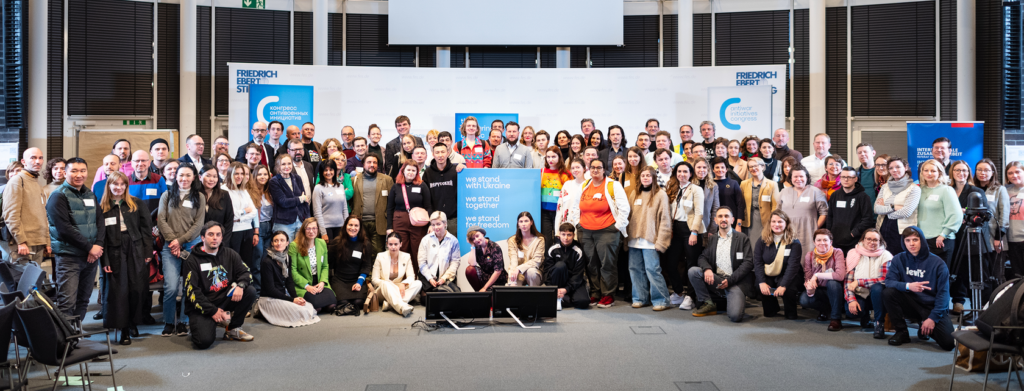The concept of establishing the Antiwar Initiatives Platform originated during the Antiwar Initiatives Congress held in Berlin in December 2022. At the congress, members formed a contact group responsible for crafting foundational documents and initiating the launch of the Platform.

Today, the Platform stands as a community comprised of 50 antiwar, human rights, humanitarian, educational, cultural, decolonial, LGBTK+, feminist, and research initiatives and organizations. This network includes independent media, activists, and journalists both within and beyond Russia. Collectively, we:
- Stand against the Russian War on Ukraine.
- Advocate for democracy in Russia.
- Share the Platform’s mission, goals, values, and principles.
Please note that we intentionally omit details. On this page, the Platform’s operation is described in broad strokes. The full text is sent to potential Platform participants before joining.
The Platform is an open, horizontal network of anti-war, human rights, humanitarian, enlightenment, cultural, decolonial, LGBTQ+, feminist, and research initiatives and organizations, independent media, activists, and journalists within and beyond Russia. They:
- Stand against Russia’s war with Ukraine.
- Advocate for democracy in Russia.
Our mission is to achieve the cessation of Russia’s aggression against Ukraine, overcome the consequences of the war, and establish democracy in Russia.
Platform Goals and Objectives:
- Develop anti-war initiatives and promote their collaboration.
- Support and implement joint initiatives aimed at ending Russian aggression against Ukraine and addressing the aftermath of the war.
- Unite efforts and act collectively to exchange experience and resources, amplify the voices of Platform participants, enhance public awareness, defend the interests of the anti-war community, and increase its political influence.
- Foster close cooperation among anti-war projects, initiatives, organizations, and activists, ensuring their sustainability and effectiveness.
- Expand the circle of activists engaged in anti-war activities.
- Promote the development of democracy and civil society in Russia.
- Support and develop civil resistance, civic participation, and self-governance projects and initiatives in Russia.
- Introduce joint new secure solutions for the development and support of cooperation among democratically-minded Russians, both inside and outside Russia.
- Engage in a dialogue with international partners: activists, journalists, politicians, and the wider public.
- Develop joint approaches and positions regarding current issues and events.
Platform Values:
Platform participants build their collaboration based on the following values:
- Human Rights and Freedoms: Platform participants adhere to the principles outlined in the European Convention on Human Rights and the Universal Declaration of Human Rights. They are guided by the idea of respecting rights and freedoms, as well as the freedom and dignity of every individual.
- Democracy: Platform participants adhere to the understanding of democracy as described in the Universal Declaration of Human Rights and the International Covenant on Civil and Political Rights. They support open discussions, consideration of all stakeholders’ opinions, and the desire to reach consensus or compromise when making decisions.
- Non-Violence: Platform participants do not use means and methods of aggressive violence (such as terrorism, acts of terror, killings, assaults, and torture) to achieve political and civic goals.
- Equality and Diversity: Platform participants recognize the importance of equality and diversity. They support access to fundamental rights and consider the opinions of individuals and social groups, regardless of their gender, gender identity, sexual orientation, ethnicity, language, religion, and other identities.
Platform Principles:
The activities of Platform participants are based on principles that promote fair and effective communication and positive relationships among participants.
- Voluntariness implies that participation in the Platform is based on the free and conscious choice of participants, without coercion or obligations.
- Horizontalness is a crucial feature of the Platform, where all participants are equal, participate in decision-making, and interact. Every voice carries equal weight.
- Inclusivity and zero tolerance for discrimination and xenophobia mean that the Platform welcomes diversity and respects all participants, regardless of their race, gender, nationality, religion, or other characteristics.
- Empathy, mutual respect, and support are the foundation of interaction within the Platform, where participants strive to understand and support each other, considering their opinions, needs, and vulnerabilities.
- Civic Responsibility implies that Platform participants recognize their role in achieving the common goal, take responsibility for their actions, and actively participate in solving societal issues and problems.
How the Platform Works
The idea of our interaction system is to create a system of interaction instead of forming traditional vertical structures.
Key features of this model include:
- Inclusivity: All participants are equal and involved in decision-making processes.
- Horizontal Structure: Absence of hierarchy and vertical structures; all interactions occur on an equal basis.
- Rules Instead of Structures: The model operates based on rules that are accepted and followed by all participants.
- Distributed Decision-Making System: Decision-making processes, responsibility distribution, and task execution are decentralized to facilitate the Platform’s development.
To successfully operate such a model, it’s important to maintain:
- Diversity of thoughts and perspectives, valuing diversity and openness to various ideas and viewpoints.
- Respect and trust among participants, respecting each other’s knowledge and experiences and trusting one another.
- Openness to mistakes, viewing errors as opportunities for growth and development, with participants supporting each other rather than causing harm.
- Personal responsibility, where all participants are capable of critically evaluating their competencies, workload, and readiness to take on responsibilities.
For the sustainability of this model, attention should be given to the following aspects:
- Acceptance and adherence to rules: It’s important to follow established rules and be flexible in adapting them, especially in newly arising situations.
- Equal access to information: Ensuring equal access to information for all participants and the ability to join and disconnect from the Platform.
- Platform Participants
Members of the Platform
Both collectives (organizations, project teams, associations, communities) and individual activists can join the Platform. When joining the Platform, all participants must share the Platform’s mission, goals, and values, as well as agree to the rules of collaboration within the Platform. All participants undergo verification before joining.
Advantages of the Platform for Participants:
- Participants can exchange experiences, knowledge, and resources to more effectively carry out their anti-war initiatives. This can include information sharing, forming partnerships for joint activities, and gaining access to funding.
- The Platform provides initiatives with a space to unite and coordinate their efforts, helping them amplify their voices and influence on anti-war matters. Collaborative actions and statements can draw more attention to issues and lead to policy changes and shifts in public opinion.
- The Platform can assist its participants in conducting informational campaigns and events aimed at public awareness regarding military conflicts and their consequences. Participants can work together to increase awareness and strengthen public opinion against war and violence.
- The Platform can offer participants the opportunity for joint lobbying and influencing political processes. They can work with governments, international organizations, and other stakeholders to change policies and legislation in favor of peace and conflict resolution.
- The Platform’s space is open to any co-creation initiatives that its participants may want to implement through the creation of working groups, thematic and territorial clusters, or projects on the Platform.
Public or Anonymous Participation:
Before joining, participants themselves choose the status in which they are willing to engage.
Open Participants: Individuals who are not located within the territory of the Russian Federation can choose this status. Open participation of initiatives or individual participants means that the names and identities of open participants can be displayed on the Platform’s website, included in the list of Platform participants, and can be incorporated into the Platform’s social media content. It’s important to note that this format does not exclude anonymous participation within the Platform.
Anonymous Participants: Participants located within the territory of the Russian Federation or those who regularly visit are recommended to apply this participation status. With anonymous participation, we do not mention your name and/or collective anywhere, and we ask all Platform participants to keep your participation hidden (+ verification will be done without a questionnaire, only through a call). Subsequent participation and communication within the platform can also occur while maintaining anonymity.
Participant Communication System:
For all communications within the Platform, a single secure working space (similar to Slack) has been chosen. In this space, participants collaborate, ask questions for discussion, request assistance or advice, express their requests or initiatives, and can organize thematic clusters, working groups, or projects.
Communication also includes:
- Regular informational online meetings of all Platform participants (suggestion: every six months).
- An annual offline meeting at the Congress of Civil Anti-War Initiatives (with participant delegation).
- Regular newsletters with information about current events within the Platform, event digests, and other information.
- Regular interaction formats in various working groups, projects, and clusters.
Leadership and Working Bodies:
- Collegium: This body makes strategic decisions within the Platform. It serves as an advisory body to which all initiatives send their representatives and representation of individual participants.
- Organizing Group: These are participants who provide technical support for processes and respond promptly to difficulties but do not make strategic decisions.
The Organizing Group and Collegium oversee only the general processes of the Platform’s functioning. Decisions regarding specific projects, tasks, and others are made by the participants themselves.

